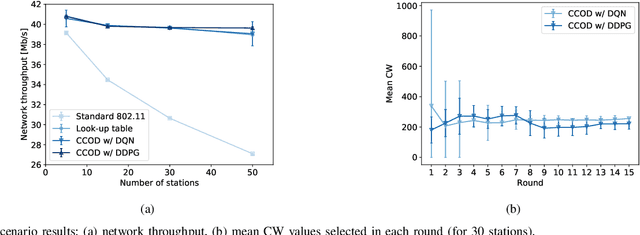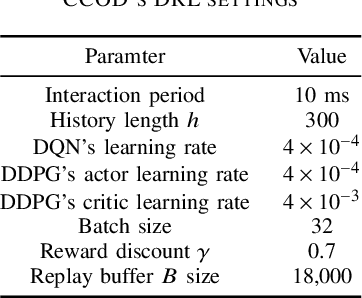Szymon Szott
Coordinated Multi-Armed Bandits for Improved Spatial Reuse in Wi-Fi
Dec 04, 2024



Abstract:Multi-Access Point Coordination (MAPC) and Artificial Intelligence and Machine Learning (AI/ML) are expected to be key features in future Wi-Fi, such as the forthcoming IEEE 802.11bn (Wi-Fi 8) and beyond. In this paper, we explore a coordinated solution based on online learning to drive the optimization of Spatial Reuse (SR), a method that allows multiple devices to perform simultaneous transmissions by controlling interference through Packet Detect (PD) adjustment and transmit power control. In particular, we focus on a Multi-Agent Multi-Armed Bandit (MA-MAB) setting, where multiple decision-making agents concurrently configure SR parameters from coexisting networks by leveraging the MAPC framework, and study various algorithms and reward-sharing mechanisms. We evaluate different MA-MAB implementations using Komondor, a well-adopted Wi-Fi simulator, and demonstrate that AI-native SR enabled by coordinated MABs can improve the network performance over current Wi-Fi operation: mean throughput increases by 15%, fairness is improved by increasing the minimum throughput across the network by 210%, while the maximum access delay is kept below 3 ms.
Machine Learning & Wi-Fi: Unveiling the Path Towards AI/ML-Native IEEE 802.11 Networks
May 19, 2024



Abstract:Artificial intelligence (AI) and machine learning (ML) are nowadays mature technologies considered essential for driving the evolution of future communications systems. Simultaneously, Wi-Fi technology has constantly evolved over the past three decades and incorporated new features generation after generation, thus gaining in complexity. As such, researchers have observed that AI/ML functionalities may be required to address the upcoming Wi-Fi challenges that will be otherwise difficult to solve with traditional approaches. This paper discusses the role of AI/ML in current and future Wi-Fi networks and depicts the ways forward. A roadmap towards AI/ML-native Wi-Fi, key challenges, standardization efforts, and major enablers are also discussed. An exemplary use case is provided to showcase the potential of AI/ML in Wi-Fi at different adoption stages.
Contention Window Optimization in IEEE 802.11ax Networks with Deep Reinforcement Learning
Mar 03, 2020


Abstract:The proper setting of contention window (CW) values has a significant impact on the efficiency of Wi-Fi networks. Unfortunately, the standard method used by 802.11 networks is not scalable enough to maintain stable throughput for an increasing number of stations, despite 802.11ax being designed to improve Wi-Fi performance in dense scenarios. To this end we propose a new method of CW control which leverages deep reinforcement learning principles to learn the correct settings under different network conditions. Our method supports two trainable control algorithms, which, as we demonstrate through simulations, offer efficiency close to optimal while keeping computational cost low.
 Add to Chrome
Add to Chrome Add to Firefox
Add to Firefox Add to Edge
Add to Edge